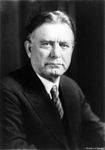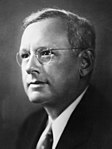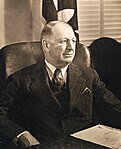
Summary
From March 10 to May 19, 1936, voters of the Republican Party chose its nominee for president in the 1936 United States presidential election. The nominee was selected through a series of primary elections and caucuses culminating in the 1936 Republican National Convention held from June 9 to June 12, 1936, in Cleveland, Ohio.[1]
| |||||||||||||||||||||||||
| |||||||||||||||||||||||||
 First place finishes by popular vote
| |||||||||||||||||||||||||
| |||||||||||||||||||||||||
Although many candidates sought the Republican nomination, only two, Governor Alfred Landon and Senator William Borah, were considered to be serious candidates.[citation needed]
While favorite sons County Attorney Earl Warren of California, Governor Warren E. Green of South Dakota, and Stephen A. Day of Ohio won their respective primaries, the 70-year-old Borah, a well-known progressive and "insurgent," carried the Wisconsin, Nebraska, Pennsylvania, West Virginia, and Oregon primaries, while also performing quite strongly in Knox's Illinois and Green's South Dakota. However, the party machinery almost uniformly backed Landon, a wealthy businessman and centrist, who won primaries in Massachusetts and New Jersey and dominated in the caucuses and at state party conventions.
Schedule and results edit
| Date | Primary | William Borah | Alfred Landon | Frank Knox | Earl Warren | Stephen A. Day | Warren E. Green |
|---|---|---|---|---|---|---|---|
| March 10 | New Hampshire | 0% | 0% | 100% | 0% | 0% | 0% |
| April 7 | Wisconsin | 98% | 2% | 0% | 0% | 0% | 0% |
| April 14 | Illinois | 46% | 0% | 54% | 0% | 0% | 0% |
| April 14 | Nebraska | 74% | 25% | 0% | 0% | 0% | 0% |
| April 28 | Massachusetts | 4% | 80% | 2% | 0% | 0% | 0% |
| April 28 | Pennsylvania | 100% | 0% | 0% | 0% | 0% | 0% |
| May 5 | California | 0% | 43% | 0% | 57% | 0% | 0% |
| May 5 | South Dakota | 50% | 0% | 0% | 0% | 0% | 50% |
| May 12 | Ohio | 3% | 6% | 0% | 0% | 90% | 0% |
| May 12 | West Virginia | 85% | 0% | 0% | 0% | 0% | 0% |
| May 15 | Oregon | 90% | 4% | 0% | 0% | 0% | 0% |
| May 19 | New Jersey | 21% | 79% | 0% | 0% | 0% | 0% |
Candidates edit
Major candidates edit
These candidates participated in multiple state primaries or were included in multiple major national polls.
| Candidate | Most recent position | Home state | Campaign | ||
|---|---|---|---|---|---|
| Alf Landon | Governor of Kansas (1933–37) |
Kansas |
(Campaign) | ||
| William Borah | U.S. Senator from Idaho (1907–40) |
Idaho |
(Campaign) Withdrew at convention | ||
| Frank Knox | Publisher of the Chicago Daily News |
Illinois |
Withdrew before convention | ||
Favorite sons edit
The following candidates ran only in their home state's primary or caucus for the purpose of controlling its delegate slate at the convention and did not appear to be considered national candidates by the media.
- Businessman Stephen A. Day of Ohio
- Former Governor Warren Green of South Dakota
- Alameda County District Attorney Earl Warren of California
Declined to run edit
The following persons were listed in two or more major national polls or were the subject of media speculation surrounding their potential candidacy, but declined to actively seek the nomination.
- Senator Lester J. Dickinson of Iowa (ran for re-election instead)
- Former President Herbert Hoover of California
- Former Governor Frank Lowden of Illinois
- Senator Arthur Vandenberg of Michigan
Polling edit
National polling edit
| Poll source | Publication | ||||||
|---|---|---|---|---|---|---|---|
| Gallup[2] | Oct. 1935 | 26% | 1% | 12% | 8% | 33% | 3% |
| Gallup[2] | Jan. 1936 | 28% | 1% | 17% | 7% | 43% | 4% |
| Gallup[2] | March 1936 | 20% | 1% | 14% | 5% | 56% | 4% |
| Gallup[2] | Apr. 1936 | 19% | 1% | 14% | 5% | 56% | 5% |
| Gallup[2] | Apr. 1936 | 18% | 1% | 14% | 6% | 55% | 6% |
Convention edit
With Knox's candidacy withdrawing in order to become Landon's selection for vice president, and Day, Green, and Warren releasing their delegates, Landon's victory was assured.
| Ballot | Alfred Landon | William Borah | VP Ballot | Frank Knox |
|---|---|---|---|---|
| First | 984 | 19 | First | 1,003 |





